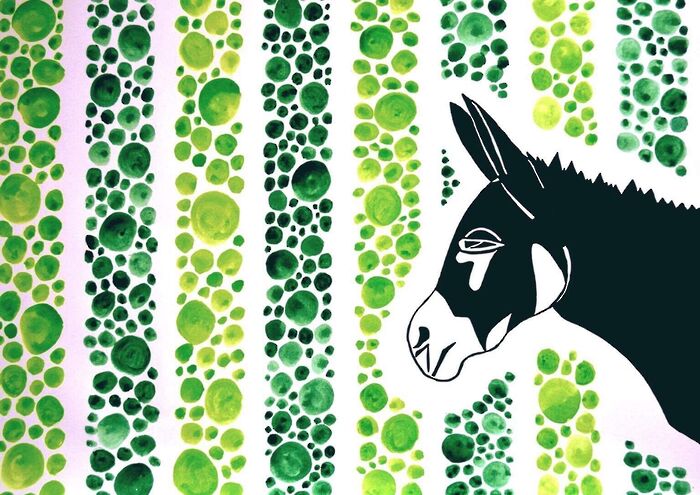Orlando preview
Phoebe Segal’s new staging of Virginia Woolf’s iconic exploration of gender is collective experience brought by a strong ensemble, says Ella Blackburn

Orlando has often been called the longest love letter ever written in literary history. It is clear that Phoebe Segal’s production lives up to this reputation. Sarah Ruhl’s adaption of Virginia Woolf’s novel transfers wonderfully to the stage – from the glimpses of rehearsals I have seen, Orlando radiates a joyfulness that comes with simple storytelling in its purest form. Woolf’s novel is an ode to her lover Vita Sackville West: a love story spanning three centuries, crossing continents, meditating on time, gender and sexuality. It follows the story of a beautiful and charismatic nobleman who enjoys a life of adventure and indulgence as an ambassador in Constantinople before awakening from a seven-day sleep to find themselves not be a nobleman, but a noblewoman.
It is a tale so fantastical and fabulist that you would perhaps be forgiven for wondering how such a novel could translate to the intimacy of the Corpus Playroom stage. And yet, Orlando never loses sight of its origins. Ruhl’s adaptation uses narrative and a chorus to enact lyrical and whimsical transformations through beautiful prose. As Segal’s cast tells me, what is compelling about working with a script that values its narrators so highly is that it enables the actors to engage with the intricacies of story-telling. The chorus is never neutral, each of Orlando’s biographers has a different personality and approach that is in keeping with Woolf’s parodying tone, at once merging the mock-serious with acknowledgements of the biases of storytelling so that the meta aspects of the novel translate perfectly to the stage. Theatricality lends itself well to the way in which Woolf presents gender, with costume and expression commenting on the performative nature of masculinity and femininity. Segal mentions how much she has loved playing with caricature and cliché after first setting up naturalistic foundations, an approach that seems to be particularly important when multi–roling. Whilst Georgina Taylor remains constant as our ever-evolving eponymous Orlando, each other cast member plays one key role, as well as a host of minor characters, and a narrator/biographer. Juliet Martin is Sasha, Rosy Sida plays the Archduchess, Pol Bradford-Corris plays Marmaduke, and Alice Tyrell plays Queen Elizabeth I.
"There is a synchronicity to the cast that perfectly mirrors the script"
This play clings to Woolf’s brightness and wit, deriving much from Woolf’s descriptively rich text, however, Segal incorporates physical theatre into the production to accompany the narrative so that no actor ever feels redundant and the narration never feels cumbersome. In fact, all five actors remain on stage for the entirety of the production. Collaboration, then, is key, and what a beautifully collaborative rehearsal space it is. This was clearly a cast who had become tight-knit in the weeks of rehearsals; each actor freely trying out new ideas and suggesting creative ways to mirror the narration. This atmosphere seems to be the product of Segal, Reidy and Waring’s approach to direction, and she tells me about how much she’s enjoyed exploring the skill sets of each of her actors and making full use of them. One of the ways in which this becomes apparent is the use of consent training in the more movement heavy episodes: Segal explains that two of her actors had run workshops at the beginning of rehearsals so that the cast could navigate the initial awkwardness that is sometimes presented by ensemble work together comfortably. This certainly pays off – there is a synchronicity to the cast that perfectly mirrors the script, making this production a delicately poetic dance between the fantastical and relatable human experience.
Woolf’s novel is arguably famous for its discussion of gender. Over the centuries, Orlando remains the same person despite shifting between male and female and having to reckon with the various restrictions that society places upon women. At one point, Orlando faces two lawsuits denying them (as a woman) the right to own property because she is “dead, and therefore cannot hold any property whatsoever,” and also because she is “a woman, which amounts to much the same thing.” Woolf also presents the idea that love can continue regardless of the physical form, that the connections between Orlando and their lovers are essential rather than simply corporeal. This incredibly romantic approach to character as a collection of essential qualities that exist regardless of gender makes for a love story that is joyful in its purity. Gender almost becomes a non-issue in that each character is defined by so much more than the binary of man or woman.
In short, go and see Orlando. This production manages to keep the magic and intimacy of the novel whilst also turning what is usually a solitary enjoyment into a collective experience. It retains its dream-like nature whilst also allowing the audience to share in the playfulness and the wryness of Woolf’s humour, and so expands upon Woolf’s novel rather than being restricted by such a well-loved text. But most of all, this is theatre that takes a story and gifts it to the audience. As one cast member succinctly puts it: ‘it’s just proper story-telling’.
 Features / Cloudbusting: happy 10th birthday to the building you’ve never heard of30 March 2025
Features / Cloudbusting: happy 10th birthday to the building you’ve never heard of30 March 2025 News / Uni offers AI course for Lloyds employees30 March 2025
News / Uni offers AI course for Lloyds employees30 March 2025 News / Caius clock hand returned nearly 100 years after student prank31 March 2025
News / Caius clock hand returned nearly 100 years after student prank31 March 2025 News / Ski mask-wearing teens break into Caius accommodation27 March 2025
News / Ski mask-wearing teens break into Caius accommodation27 March 2025 News / Write for Varsity this Easter31 March 2025
News / Write for Varsity this Easter31 March 2025






